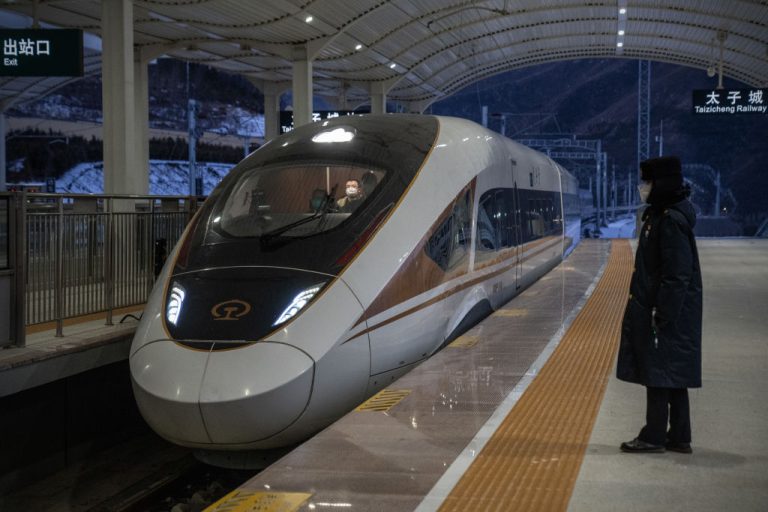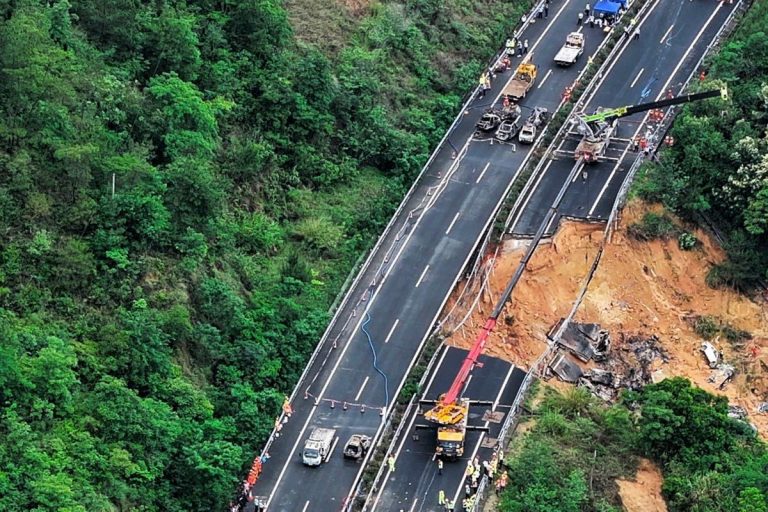On the evening of Aug. 12, Chinese passengers from different lines posted that the high-speed rail trains they usually commute in were either delayed or completely stopped.
According to mainland Chinese media reports, railway stations in Chongqing, Chengdu, Jinan, Shenyang, Guangzhou, Nanjing as well as a few other railway hubs had experienced “large-scale delays” occurring at the same time.
Though the reason for the delays was not explained, the incidents sparked heated discussions among Chinese netizens. Video posted across various social media platforms showed China’s highly vaunted high-speed trains parked motionless on their tracks, prompting comments such as: “The high-speed rail isn’t so speedy now.”
One user expressed concerns regarding supply chain issues that could be affecting the Chinese rail network, and the economy as a whole.
MORE ON GLOBAL SUPPLY CHAIN ISSUES:
- China Experiencing Worst Capital Flight in 7 Years, Manufacturers Also Hit Hard
- China Fights Uphill Battle to Rescue Its Economy While Keeping ‘Zero-COVID’
- Here’s Just How Badly ‘Zero-COVID’ Has Damaged China’s Economy
- US Auto Industry Drops 100,000 Vehicles From Production in a Single Week Due to Chip Shortages
- Chipmakers Facing Dark Days as Middle Class Suffers
Some internet users reported that during the evening of Aug. 12, train arrival times were displayed as: To be determined,” but were then changed to: “Delayed by 2 hours and 32 minutes.”
Success
You are now signed up for our newsletter
Success
Check your email to complete sign up
“Southwest Railway” — the official social media account of the China Railway Chengdu Group — eventually responded to the complaints, stating that at around 6:30 p.m. on Aug. 12, the railway department found that some “equipment was faulty and was working on restoring the transportation order.” Some Chengdu Group trains would therefore be running on a delayed schedule, the authority added.
Netizens react
“The Z349 train was delayed by six hours, more than enough time to make two high-speed rail round trips. The train staff announced that there was a problem on the line, and then didn’t give any hint of a solution. Everyone is in a hurry, but this attitude is really problematic.”
Other netizens reported that the stated reason for the delay was not a “line problem,” but “inclement weather” — despite it being sunny. “They said it was due to the weather, but it was obviously sunny, and the delay was over an hour, which is inexplicable,” one person said.
Other users speculated whether the delays were likely caused by a widespread power outage, “It’s unprecedented,” one person said, adding that, “The railway bureau’s power grid was cut off, and the intranet was disconnected. Hundreds of high-speed trains in Sichuan have stopped in place, seemingly unwilling to move.”
READ MORE:
- Toyota’s Chinese Factory Shutters Because of Drought-induced Electricity Shortage
- 900 Million People in China Affected by Heat, Power Cuts as Sweltering Temperatures Break 111 Degrees
Some netizens opted for a more optimistic outlook: “It’s really unimaginable. Fortunately, it was just a delay. Imagine the disaster if there was a large-scale control failure and the trains couldn’t be stopped,” a comment says.
Others expressed suspicion about the delays being part of a larger issue. “If it is true, the reason is very doubtful. GSM-R does not rely on the national central node, and the possibility of pure technical problems causing widespread failures in different parts of the country at the same time seems to be very small,” one user wrote.
China’s vaunted high-speed trains
The delays come as a shock due to the prestige attached to the efficiency and punctuality of China’s high-speed rail system — which state media has often compared favorably with those in Japan and Europe.
This isn’t the only issue facing China’s transportation systems, as other forms of public transit have also seen difficulties in recent months.
Mainland Chinese media reported that some local governments were struggling to bankroll public services.
In Zhoukou, a city in the central Henan Province, state-owned Dancheng County Bus company issued a notice on Aug. 12 stating that it would be suspending all urban bus services due to “operational difficulties,” stemming from the government’s inability to pay its drivers’ wages.
Chinese media also reported that another bus line located in Guangdong’s Yangjiang City had suspended services since June — citing a “shortage of funds.”
Some netizens underscored the similarities between Liu Zhijun, China’s former Minister of Railways who was arrested and sentenced to death in 2013, and the ongoing corruption within the Chinese government that has resulted in the near total collapse of its economy.
Long-lasting economic repercussions
Others drew parallels between China’s struggling industrial output and unrelenting “zero-COVID” policies playing a role in the high-speed rail network delays.
“China’s high-speed rail has imported a large number of components, especially the weak current control system, mainly from a German company established in 1951,” one user said, adding that since the Russian invasion of Ukraine, this company has stopped supplying key parts to Chinese clients due to China’s allyship with Moscow.
Some analysts also speculated that the system’s failure to “register the joint control system,” may have resulted in “large scale paralysis,” whereby the system’s original design did not “take into account an ‘error correction mechanism’ after problems occurred,” resulting in a “systemic defect.”














